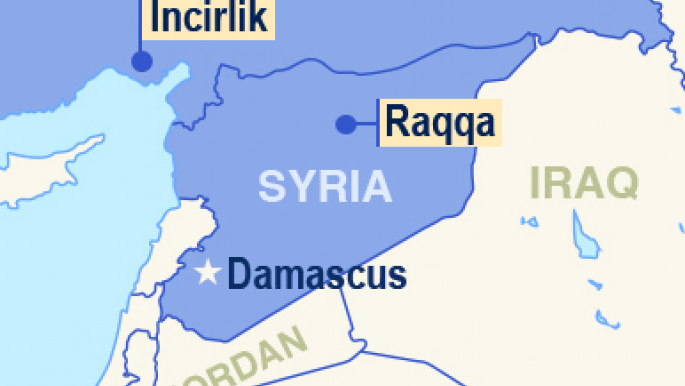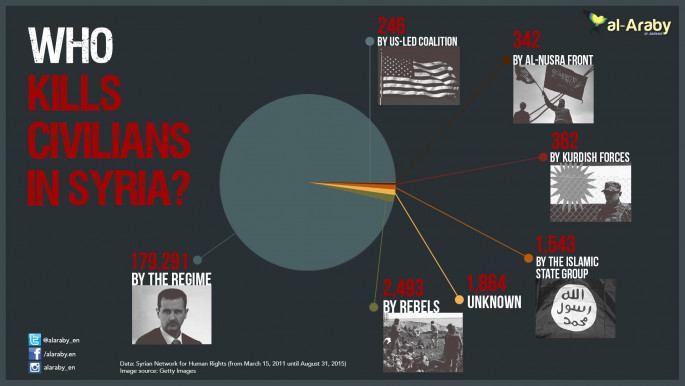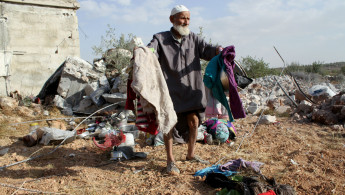Russia on the defensive with its offensive in Syria
Russian intervention in Syria could be the biggest threat in decades to Pax Americana in the Middle East - although the alternative on offer appears to be equally as damaging.
Russian airpower is for the first time projected across the eastern Mediterranean and within striking distance of key US allies - Jordan, Israel and Turkey, a Nato member.
On Monday, Ankara witnessed Russian jets encroaching on its airspace, something that Baltic and Scandinavian states have grown used to over the past year.
Turkish F-16s were scrambled to intercept the Russian war plane, while another "unidentified" aircraft reportedly "harassed" a Turkish border patrol.
Russia blamed a "navigational error", but Moscow's repeated violations of the airspaces of its northern European neighbours' would suggest that such incursions will occur again in Turkey.
The fact that it happened inside Hatay - an Arabic-speaking province in Turkey which Syria still claims, has also raised eyebrows.
Russian planes are stationed at Latakia's Hmeimim airbase, just 50 kilometres (31 miles)from the Turkish border.
It means that they can reach the Turkish airspace within minutes and has kicked Turkey's "no-fly-zone plan" into touch - at least for now.
Tactical manoeuvres
It has also been a set-back for the West's anti-Islamic State group coalition - and its ability to strike targets inside Syria.
Russian aircraft cluster the skies and without integrated air command, could lead to clashes between Russian and Western air forces.
 |
Writing on 27 September for the Institute for the Study of War, Frederick W Kagan and Kimberly Kagan predicted that the US would concede to Russian dominance in the air to Russia for this reason.
The analysts believed that this could be a deliberate act by Putin.
It would allow the more "irresponsible" party - which in this case is deemed to be Russia - to dictate the rules of aerial intervention in Syria, according to the recently popular principle of "de-confliction".
The same could apply to Turkey, which has clashed several times with the Syrian air force - including in 2014 when a Turkish F-16 shot down a Syrian fighter-bomber in its skies.
Ruslan Leviev - a Russian investigative journalist from the WIU team - believes that Russia's violation of Turkish airspace was most likely "accidental".
However, Russia's entrance into the war has brought a significant aerial threat to Turkey's southern border for the first time in years.
Ankara's open support for the Syrian opposition also puts it in an awkward position.
Armed opposition groups it supports - fighting both Assad and IS - are being hit by bombs under Russia's blatantly false pretext that it is only targeting IS or "terrorists".
Latakia airbase now hosts at least 12 Su-25 Frogfoot attack planes - "mostly used against ground targets" - and at least 12 Su-24 Fencer bombers, Leviev said.
This is in addition to four Su-30SM Flanker fighters that are "designed for air recon and guiding a fighter group" and at least four Su-34 Fullback frontline bombers.
There are also between four to six Mi-24 Hind attack helicopters at the base, which could prove to be a significant threat to opposition forces on the battlefield.
"These aircraft were transported to Syria long before official approval was granted by the Russian parliament," he said.
Blind to the consequences?
In the bulk of air raids, Russian war planes have used OFAB-250 fragmentation high-explosive, BETAB-500 concrete piercing bombs, and FAB-500 high-explosives.
"These bombs aren't 'guided' or 'precision' and are used by the bulk of Russia's air group in Syria," he said.
|
— Silver Surfer (@RobPulseNews) October 5, 2015" style="color:#fff;" class="twitter-post-link" target="_blank">Twitter Post
|
"While we can't say that all bombs the Russian Air Force uses in Syria are unguided - such as the KAB-500S-E satellite-guided weapons - we believe this is to be true for the majority of them."
Hitting populated areas with such weapons has already led to a huge number of civilian deaths in the past week.
IS fighters and weaponry are often positioned in civilian areas during air raids, and this has likely contributed to the deaths of dozens of women and children.
Although the Western coalition has also killed dozens of civilians, many analysts say it probably takes greater care not to hit populated areas:
Despite the US launching more than 6,000 air raids on IS territory, conservative critics - including Putin - believe that Washington and its allies are being too prudent in target selection - usually to minimise "human casualties".
Many jets return to their base with their bombs still loaded, while Russia has claimed to have IS "on the ropes" with dozens of fighters deserting due to its intensive bombing.
"Su-25s and Su-24s are capable of using guided missiles, so we can only suspect that they are too expensive or in short supply," said Leviev.
"It is evident that the Russian air force doesn't care whether they hit civilian targets so long as they are in opposition or IS-controlled areas."
Centralised control
Moscow has received the green light for its military adventure by the Syrian regime - whose own air force has likely killed tens of thousands of civilians with crude barrel bombs.
The authoritarian nature of Vladimir Putin's rule in Russia also makes him less accountable for civilian deaths.
War in Ukraine allowed Putin to test the limits of his power - both with his US-European rivals and at home. The overseas response was at first negligent, while domestically Putin has been given a popularity boost due to the war.
Leviev said that repercussions from sanctions were only felt half a year later, so it is too early to predict the diplomatic consequences of Russia's adventure in Syria.
| The authoritarian nature of Vladimir Putin's rule in Russia also makes him less accountable for civilian deaths |
Meanwhile, Putin posters are plastered on cars and cafe windows in the regime heartlands in Latakia province.
But as civilian casualties mount, Russia risks losing the sympathy and support of people in the region and its motives becoming more obvious.
Moscow likely views the Syrian opposition as representing the interests of the West and pro-US Arab nations.
"Putin considers concessions a sign of weakness and thinks the Assad government should use any means necessary to suppress the opposition."
Russia's backyard
Leviev said that Putin has supported his authoritarian allies against mass movements over the years.
This includes popular protests that swept through a number of former Soviet republics between 2003 and 2005, and the Arab Spring post-2010.
"Putin gave guarantees to several dictators that the Russian army would protect them in case of popular movements," said Leviev.
Russia has put itself forward as a military bulwark against Islamic extremism in Central Asia, which it sees as threatening its Muslim-majority republics in the Caucuses.
Treaties have been signed with the autocratic Tashkent government - to "protect" Uzbekistan militarily against extremism and terrorism. Meanwhile Moscow has military bases in Tajikistan, neighbouring Afghanistan.
"The definition of Islamic extremism and terrorism includes the protest movements that took place in neighbouring Kyrgyzstan. In return for military support, the governments must share Russia's political course," the Russian expert said.
Russian intervention in Syria is primarily about keeping the pro-Moscow president in power.
Russian air raids have been concentrated on opposition-held territories on the Homs-Hama highway, which connects Aleppo and Damascus.
"Assad's regime is mostly threatened by armed opposition and not IS," Leviev adds.
It is also unclear whether Latakia airbase or Tartous port will be made into permanent Russian bases, but Moscow wants to keep Syria at least as a friend, and perhaps a client state.
This applies to Russia's other military adventures - in Georgia's Abkhazia territory and eastern Ukraine - a main priority is to block the West's encroachment onto Russia's "backyard" or felling allied dictators.
"The substantial presence of Russian armed forces sends a message to Western countries that Russia considers Syria a region of its interest and influence and not giving in," said Leveiv.
"While Damascus remains pro-Moscow, [Russia] will protect it. Russian involvement in Syria will last for years - it is unlikely to end before the civil war ends."
 |



